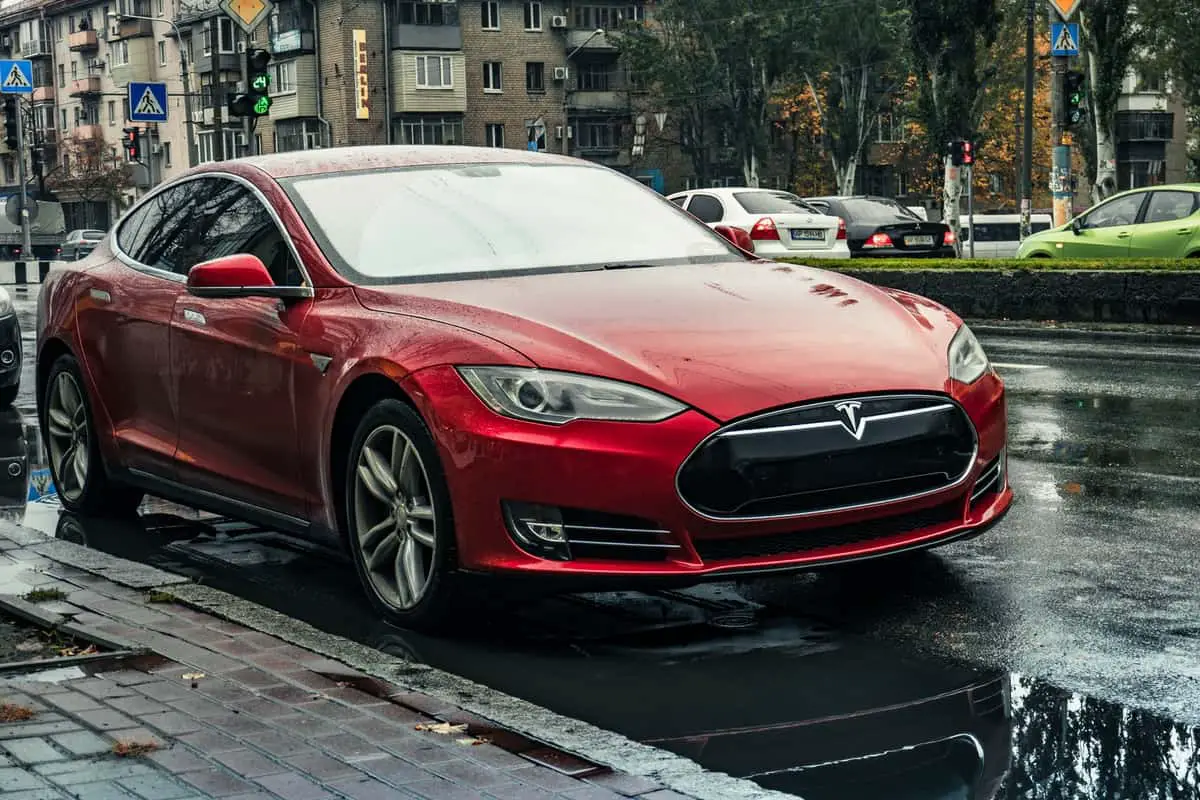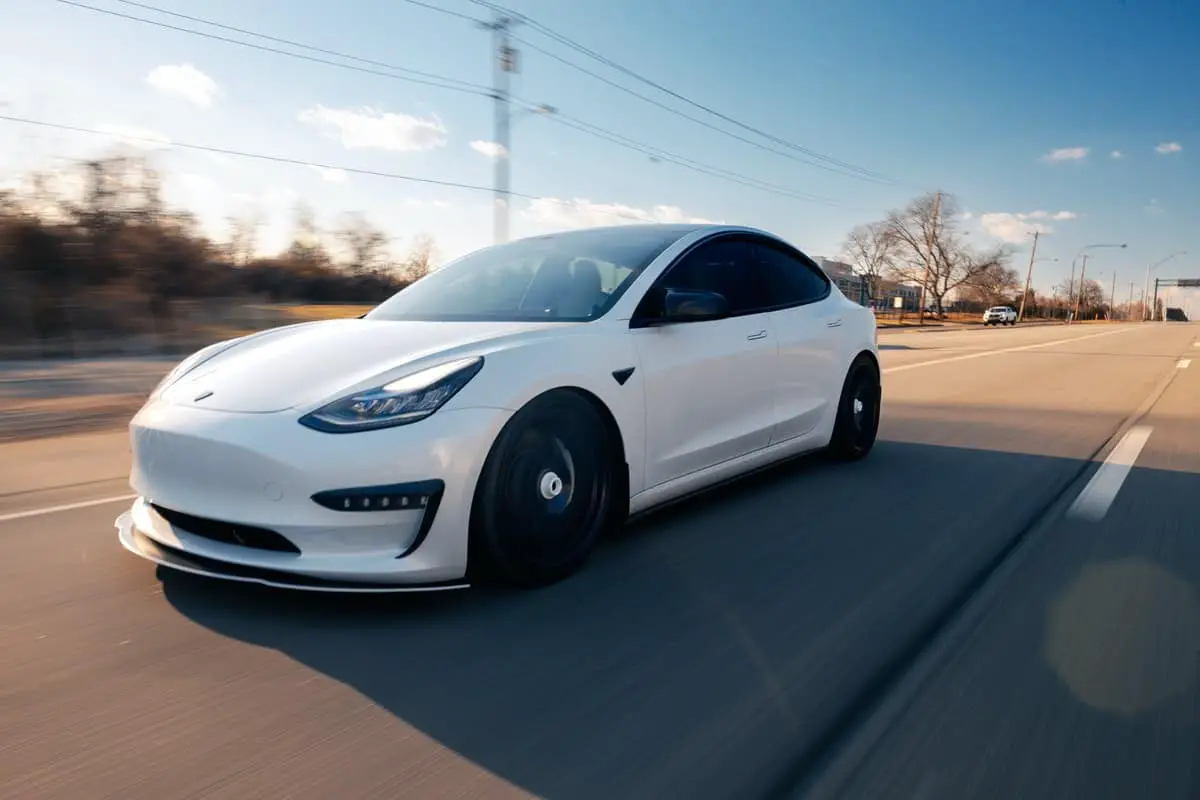A lot of people think that electric cars can’t drive at high speeds, due to the lack of gas motors.
This is not true, and they can actually accelerate faster than gas cars at certain points.
In this article, we are going to be finding out whether electric cars are faster than gas cars, and how this works. Let’s get started.

Are Electric Cars Faster Than Gas Cars?
So, which is faster; an electric car or a gas-powered car? If you want to get to 0 to 60mph in the shortest amount of time possible, an electric car may be better.
Before we get into the nitty-gritty, let’s just define the word fast.
Fast refers to the top speed that a car can hit, whereas quick means the time in which a car can get from one point to the next.
It is rare for electric cars to be able to reach higher speeds than gas-powered cars when considering long-distance travel, though their acceleration is certainly faster.
Electric cars tend to generate more torque than conventional vehicles, making for this speedy acceleration, but there is no traditional transmission, meaning that the cars are less likely to reach really high speeds.
Saying this, electric vehicles can- as mentioned- set off faster and reach top speeds quicker than conventional cars.
So whilst electric cars are faster out of the gate, they can quickly be overpowered by traditional, gas-powered cars.
Why Do Electric Cars Generate More Torque?
When we discuss torque in relation to vehicles, we are referring to the twisting force within the engine or motor that creates rotation.
This turning power plays a significant part in the acceleration of a vehicle, but it also relates to how well a vehicle can cope with certain conditions.
So why do electric cars have more torque than gas cars? The answer is so that they can run as efficiently as possible.
In this way, they can also outperform their gasoline fuelled counterparts by offering a lighter, electric motor that has one simple principle: generating as much power as possible.
How Do Electric Cars Achieve Instant Torque?
Staying on the subject of torque- seeing as it is a key element to discuss when considering the speed of an electric car-, electric cars are able to achieve instant, peak torque.
This means that they can generate torque even when they are at zero RPM (revs per minute).
Thanks to not having a gearbox or clutch with an electric car, the motor will directly send power through the wheels without having to go through these intermediaries first, which is what creates instant torque in electric cars.
Electric cars instead use currents and voltages, so all that is needed is a battery that has been fully charged in order to achieve that high level of acceleration.
This torque is what allows an electric vehicle to immediately get an advantage over a gas car when it comes to acceleration, although it cannot maintain this level of speed.
Why Can The Acceleration Speed of An Electric Car Not Be Maintained?
As mentioned, this speed can only be achieved via the acceleration of an electric car.
This is due to the torque being inversely proportional to the car’s speed, making the quick acceleration unsustainable over periods of time.
Not only that, but the rotations of the electric motor generate counter EMF, which stands for electromotive force.
This will begin to take effect as the RPM of the vehicle increases, which occurs after a certain amount of time has passed.
Counter EMF can resist supply voltage, slowing the car’s torque and preventing it from generating capacity.
Due to this issue of torque reducing as the car’s speed increases- as well as the motor of the electric car generating “back EMF” and therefore slowing down the supply voltage- an electric car simply cannot maintain that impressive acceleration speed.
Comparing The Torque
Now that we have thoroughly looked at the torque of the electric car, let’s now compare it with the torque that can be found in gas-powered cars.
The electric car has superior rotation force, allowing the car to move much faster from a stationary position.
As mentioned, this makes the acceleration capacity of an electric car much stronger than a gas-powered car, especially thanks to its unique ability to get to maximum torque levels from zero RPM.
The torque of a gas-powered car can only be generated once the diesel engine has shifted to a lower gear, as this will allow the torque to gain full momentum.
However, this is a slower process that the electric motor does not have to deal with.
It is clear that the torque from an electric car is much more beneficial, as not only is it quicker and more efficient, but it also powers a more environmentally friendly motor.
Comparing The Efficiency

When you compare an electric car that has the same horsepower rating as a gas-powered car, you will find that the electric car is able to use more of that horsepower in comparison to the gas car.
This is due to the fewer moving parts that electric vehicles tend to have, which allows them to run more efficiently.
When we discuss efficiency, we don’t just mean fuel consumption either, as both agility and speed are affected by a vehicle’s efficiency too.
An efficient vehicle also means that the car will be more cost-effective, as engine maintenance costs will reduce in the long run.
Transmission Makes A Difference
Despite the electric car generally coming out on top in terms of efficiency and performance, they do not have a traditional transmission, which naturally slows the vehicle down.
If electric cars were to have a transmission that was well designed, they would be able to manage the battery range of the car- possibly extending it significantly- as well as manage the delivery of power, allowing it to drive faster for longer.
With a good transmission, an electric car would also be able to do this whilst still wasting less energy than a gas car, hence why there are engineers working on transmission designs specifically focused on electric cars.
What Is The Top Speed Of A Gas Car?
The top speed of a gas car has been recorded to be an incredibly fast 278mph. However, this was tested with the intention of making the world’s fastest car.
This would be considerably lower if it was a regular or luxury car, but this is a supercar.
What Is The Top Speed Of An Electric Car?
There are several electric cars that can reach super high speeds.
This includes the Porsche Taycan Turbo S, which can reach 161 mph, the Tesla Model X Plaid that can reach 163 mph, the Lucid Air that can reach 168 mph, and the Lotus Evija that can reach top speeds of over 200 mph.
Are Electric Cars Better?
Electric cars are generally better than regular cars. Firstly, they have fewer components to them, meaning it is unlikely that they will break down as easily.
Even if electric cars do break down, they are cheaper and easier to fix in comparison to gas cars, which will bring down annual maintenance costs.
On the subject of maintenance, electric cars have a battery, and they do not have spark plugs or oil.
For this reason, there is no risk of things like this needing to be replaced.
This is why the average lifespan of an electric car is 20-35 years, which is considerably higher than a regular car.
Also, let’s not forget the fact that electric cars are a lot better for our environment.
Electric cars will tackle the climate change crisis because no greenhouse gases are produced from the cars.
Electric cars will lead to a safer and healthier environment that is cheaper for everyone.
Additionally, the price of electricity is increasingly cheaper than the cost of fuel, which is an added bonus.
Final Thoughts
Electric cars are going to be the new way of life, and they can go pretty fast thanks to that impressive acceleration courtesy of the improved torque.
Electric cars might not be able to maintain the same speed as some higher-end gas-powered cars right now, but they are well on their way to being able to do so at some point in the future.
For a car that is environmentally friendly as well as innovative and sure to be a vehicle of the future, then an electric car is the way to go.
Thank you for reading!
- Tesla Charger Installation Cost (Home Setups) - March 1, 2024
- Tesla Phone Key Disconnected (Troubleshooting Guide and Quick Fixes) - March 1, 2024
- Tesla FSD 12 (Explained) - March 1, 2024